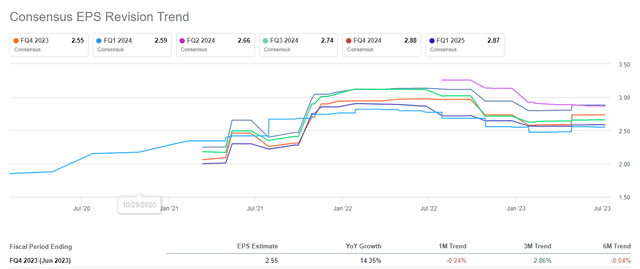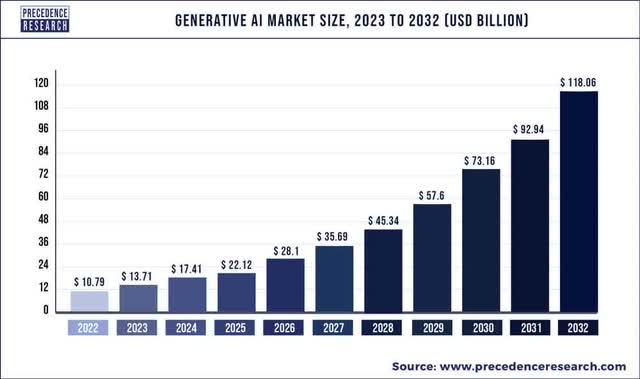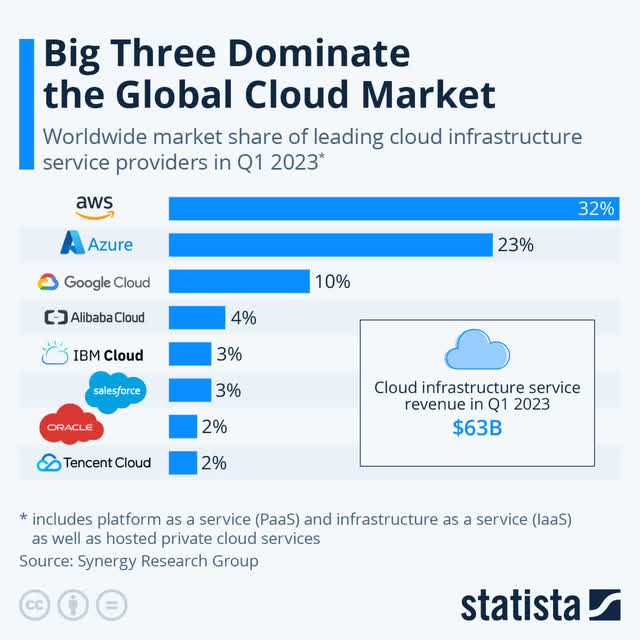Summary:
- I expect Microsoft to report strong Q4 earnings on July 25, 2023, due to AI/ChatGPT integration tailwinds in the Cloud segment as well as easing pressures in Personal Computing.
- MSFT’s topline growth re-accelerated in the previous quarter. The EPS trend is very favorable.
- The generative AI market presents a huge growth opportunity for Microsoft. New announcements regarding ChatGPT monetization paths could drive an upside revaluation later this month as well.
- While shares of Microsoft are not cheap, the company remains an interesting AI stock for long-term investors.
David Becker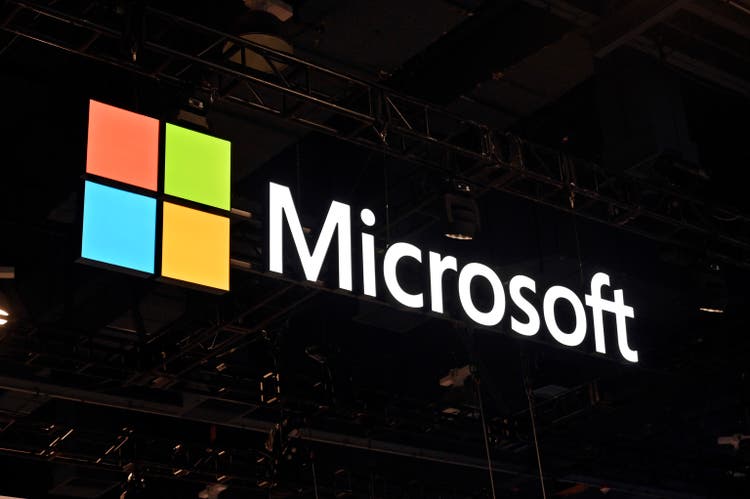
Microsoft (NASDAQ:MSFT) is going to report earnings for its fourth fiscal quarter on July 25, 2023 and I believe the software company has a good chance of crushing earnings estimates due to adoption of AI technology that could boost Microsoft’s Intelligent Cloud business growth prospects. Additionally, Microsoft has seen a re-acceleration of its growth in the previous quarter, suggesting that the PC market may have already bottomed out. Considering that shares are not overpriced based off of earnings, in my opinion, and that EPS predictions have been strongly revised to the upside lately, I can see Microsoft sailing past FQ4 earnings estimates later this month.
Microsoft’s FQ4’23 EPS expectations are in an upswing following a strong earnings release in the previous quarter
Microsoft is expected to report earnings of $2.55 per-share for its fourth fiscal quarter later this month, potentially showing a year over year increase of 14.4%. Further, Microsoft’s earnings estimates for the upcoming earnings report have consistently been upgraded, with analysts submitting 22 FQ4 EPS upside revisions compared to just 5 downside revisions. The upward trend in earnings revisions follows a strong earnings report from Microsoft in the third fiscal quarter which saw a sizable revenue beat as well less carnage in the Personal Computing business.
Personal Computing segment could see initial signs of stabilization
What is especially encouraging to me is that Microsoft’s top line growth re-accelerated in the previous quarter, in part because the Personal Computing segment posted a smaller revenue decrease (compared to FQ2), indicating that the PC market may be seeing signs of stabilization.
Microsoft’s Personal Computing segment was hit hard hit by the down-turn in the PC market in 2022 and posted 19% negative segment top line growth in FQ2’23. In FQ3’23, Personal Computing’s top line growth fell 9%, which was significantly better than in the prior quarter, and it indicates that conditions in the PC market are slowing improving, thereby limiting further downside in Microsoft’s Windows OEM and hardware business.
According to Gartner, PC shipments declined 30% in the first-quarter of 2023 as the PC market suffered from consumers holding back on computer upgrades (which they already did during the pandemic) as well as high inventories.
As the market works through these issues, however, there is cause for optimism. Projections indicate that the PC market may have already bottomed (or is close to bottoming): analysts at Canalys expect a rebound in the PC market in the second half of FY 2023 while Statista Market Insights projects a stabilization of desktop and laptop sales in 2023 and a recovery next year.
Source: Statista Market Insights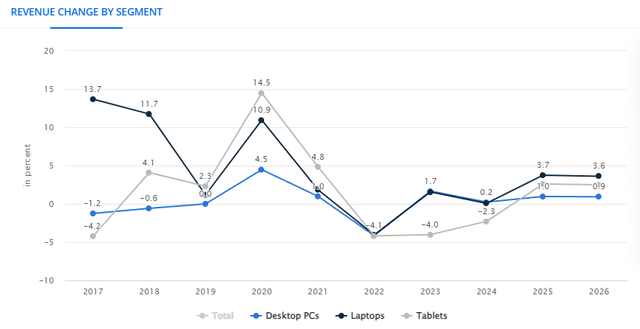
In other words, there is a good chance that the worst is already behind the PC market at this point which should take pressure off of Microsoft’s Personal Computing segment especially. Personal Computing has been a drag on Microsoft’s top line growth and a less-than-9% decline in Personal Computing revenues for FQ4 would likely strongly make the case that the PC market is stabilizing and that large top line declines in Microsoft’s Personal Computing segment are a thing of the past.
Generative AI will benefit the #2 cloud service provider in the market
Generative AI represents a huge opportunity for Microsoft due to the expected explosive growth as the corporate sector adopts artificial intelligence solutions to boost productivity. According to Precedence Research, the market for generative artificial intelligence is expected to increase from $10.8B in FY 2022 to $118.1B by FY 2032, implying potential growth of almost 1,000% over the next decade.
Artificial intelligence applications require a lot of computing and memory power and run on the infrastructure cloud platforms supplied by Microsoft Azure and others. Microsoft’s cloud platform Azure is the second-largest cloud service provider in the market and should be able to capture a large share of this incremental growth that comes out of the generative AI market. With a market share of 23%, Microsoft is more than twice as large as Google Cloud and trails the market leader Amazon AWS by only 9 percentage points.
Microsoft’s Intelligent Cloud business seems primed to cash in on the AI buzz: as more workloads move to the Cloud and generative AI solutions are more broadly adopted, large cloud infrastructure service providers are set to profit from incremental demand for Cloud services. Nvidia (NVDA), as an example, reported a surge in demand for its AI chips and submitted a blow-out forecast for the current quarter. Specifically, some companies, like Mercedes-Benz, are already using Azure OpenAI Service to provide customer service and every industry could ultimately transition to leveraging AI chatbots to replace traditional customer service representatives.
Since Microsoft invested $10B in ChatGPT-creator OpenAI, Microsoft may also be on the brink of making new announcements on how the company seeks to monetize its investment in the AI chatbot. Microsoft is already integrating ChatGPT into its Bing search engine and any new updates about ChatGPT and its monetization potential could move the stock when the company reports FQ4’23 earnings later this month.
Microsoft’s valuation compared to FAANG stocks
Microsoft is not the cheapest of America’s largest technology companies, but I don’t believe the company is overvalued either.
Microsoft is currently trading at a P/E ratio of 26.2X which makes it the third-cheapest technology company, after Meta Platforms (META) and Alphabet (GOOG). Amazon is still the most expensive FAANG stock with a P/E ratio of 50.1X. With Microsoft’s EPS trending up in the last three months and the upward/downward estimate revision ratio being favorable, I can see how the earnings release for FQ4 could be a potential catalyst for an upside revaluation.
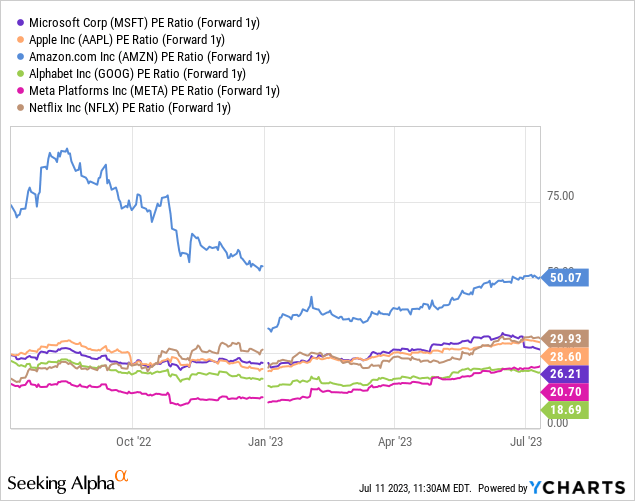
Risks with Microsoft
Microsoft’s Cloud growth has slowed in the last year because companies have optimized their IT spend in a high-inflation, high-interest rate world, but in the longer term companies have a strong incentive to invest in their digital transformation, and this includes the endorsement and adoption of AI. While I continue to see a slowdown in Microsoft’s Azure business as a risk factor in the short term, I see it mostly as a risk factor for Microsoft’s valuation. What would get me to change my opinion on Microsoft is a decline in the company’s free cash flow margins. Microsoft’s free cash flow is a top reason for me to own shares for the long term.
Closing thoughts
I believe the odds are in favor of Microsoft delivering a strong FQ4 earnings release at the end of the month because not only did Microsoft already experience a re-acceleration of its top line growth in the last quarter, but chances are that broad-based adoption of AI solutions/ChatGPT in the corporate sector are driving growth at Microsoft’s Azure unit. Additionally, revenue pressures might be easing in the Personal Computing segment which is heavily exposed to the overall health of the PC industry. While shares of Microsoft are not a complete bargain, I believe the software company is set for a strong earnings release later this month.
Analyst’s Disclosure: I/we have a beneficial long position in the shares of MSFT, GOOG either through stock ownership, options, or other derivatives. I wrote this article myself, and it expresses my own opinions. I am not receiving compensation for it (other than from Seeking Alpha). I have no business relationship with any company whose stock is mentioned in this article.
Seeking Alpha’s Disclosure: Past performance is no guarantee of future results. No recommendation or advice is being given as to whether any investment is suitable for a particular investor. Any views or opinions expressed above may not reflect those of Seeking Alpha as a whole. Seeking Alpha is not a licensed securities dealer, broker or US investment adviser or investment bank. Our analysts are third party authors that include both professional investors and individual investors who may not be licensed or certified by any institute or regulatory body.

